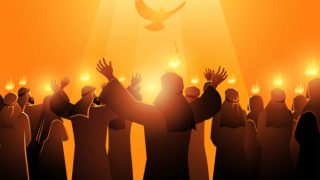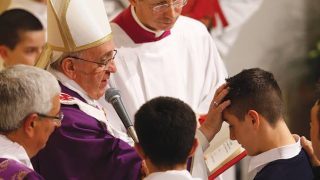
IN WHOM AND WHAT DO WE PUT OUR TRUST?
HOMILY FOR THE SIXTH SUNDAY IN ORDINARY TIME, YEAR C. Readings: Jeremiah 17:5-7; Psalm 1; 1Corinthians 15:12.16-20 and Luke 6:17.20-26.
Have you trusted someone or something so much and it got you disappointed at a point? Obviously, after several disappointments from political leaders and those in authority, partners in relationship and some other spheres of life, we find it hard to trust someone. Some ideologists have compared trust to a glass cup that when broken can never be fully regained. While the liturgy of today urges us to place our trust in God, we may likely ask: in whom and in what have we put our trust? Alternatively, is it wrong to trust someone?
The first reading from the book of the prophet Jeremiah places a contrast on the man who trusts in mortal man and the man who puts his trust in God. The reading outlines two ways of living: those who trust in mere mortals are accursed (Jer. 17:5-6), but those who trust in the Lord are blessed (Jer. 17:7-8). Jeremiah reminds us of the consequences of putting our trust in man. It is not a sin to trust people, but it is a sin to trust in people. It becomes sin when we give man the place in our hearts that rightfully belongs to God, “cursed is the man whose heart turns away from God” (Jer. 17:5). It becomes sin when we relegate God and trust more in our human intellect, wisdom or philosophy, when we trust more in our science and technology or trusting more in our riches, resources and possessions than God. The more gifted or wealthy we are, the more this is likely to be our temptation. For the consequences of this, Jeremiah said, “He is like a shrub in the desert and shall not see the good to come, he shall dwell in the parched land of the wilderness, in an uninhabited salt land” (v.6).
Some of us have placed our trust in money and we are ready to do anything to get it. Our craving for money has become so alarming that the thought of God has become secondary. This craving for money has become an idol worship that has encroached into the atmosphere of Christian worship. Practically everyone is only interested in how to make money and sad enough that the sole aim of some religious body is just to make money. We cannot solely place our trust in money and at the same time trust in God. Money itself is not bad nor evil, but the moment we engage in any dubious means to make money, we are outrightly saying we do not trust in God but in our human capacity.
On the other hand, Jeremiah enacts the reward of those who put their trust in the Lord. “Blessed is the man who trusts in the Lord, whose hope is the Lord” (v.7). This reading is very similar to the psalm of today (Psalm 1), which pronounces blessings on those who take delight in the Lord and ponder on his law night and day. “Such persons will be like the trees planted beside the flowing waters, whose leaves shall never fade and all he does prosper” (Ps. 1:3). The trees planted beside flowing waters is a metaphor for a life lived under excellent conditions and would be able to grow and produce fruits. It serves as a metaphor for those who trust in God, despite adversities, they will continue to flourish. It serves as possible response to likely questions from observations in the society of persons who put their trust in God, yet appear not to be flourishing, but suffering enormously.
In view of the above, Luke in the Gospel presents to us the sermon on the plain, “Jesus came down with the Twelve and stood on a level place” to deliver his sermon. This is the sermon the gospel of Matthew 5:1-12 presents as the beatitude, which differs from Luke. While Matthew has nine beatitudes and no woes, Luke has four beatitudes and four matching/fitting woes, which are: the poor and the rich, the hungry and the full, the weep and the laughing, and lastly is the hated and the well-spoken of. Both the beatitudes and the woes give a descriptive and established reality.
When Luke speaks of the poor, it is not only those who are financially impoverished. Luke likely intends to include other disadvantaged people such as the powerless and marginalized. We wonder why Jesus would bless the poor and pronounce woe to the rich. We can offer only tentative answers. Perhaps more of the rich are tempted to trust in their wealth, while the poor are more likely to trust in God. Perhaps more of the rich use improper means to attain their wealth and they are inclined to take advantage over the poor and more vulnerable people. However, there are some rich people with a high level of trust in God who are exceedingly generous to the poor and the society. There are also poor people who neither have trust in God nor are generous in their little capacity. This sermon is practically good news to the poor disciples who have left everything to follow Christ. When we faithfully follow Christ in His attitude, we live the beatitudes and are assured of the promise of his kingdom at the resurrection; otherwise, we should expect the woes.
It is on this note that St. Paul asks in the second reading, “If Christ is preached as raised from the dead, how can some of you say there is no resurrection from the dead?” St. Paul affirms that those who have fallen and who will fall in Christ will certainly be raised up with Him. This is our hope, this is our faith and in Christ we put our trust.
“Those who put their trust in the Lord are like mount Zion that cannot be shaken” (Ps. 125:1). Hence, while the first reading accursed those who put their trust in mortal men and blessed those who put their trust in God, Christ in the gospel similarly gave his blessings on those who seek his attitude and woes to those who do not. In the Blessed and the woes, the emphasis is to avoid being possessed by our possessions and embrace the act of generosity. May God help us to ‘Be-attitude’ of Christ.
Happy Sunday!
Fr. Ken Dogbo, OSJ











Nice homily padre more grace upon you
Thanks and God bless you